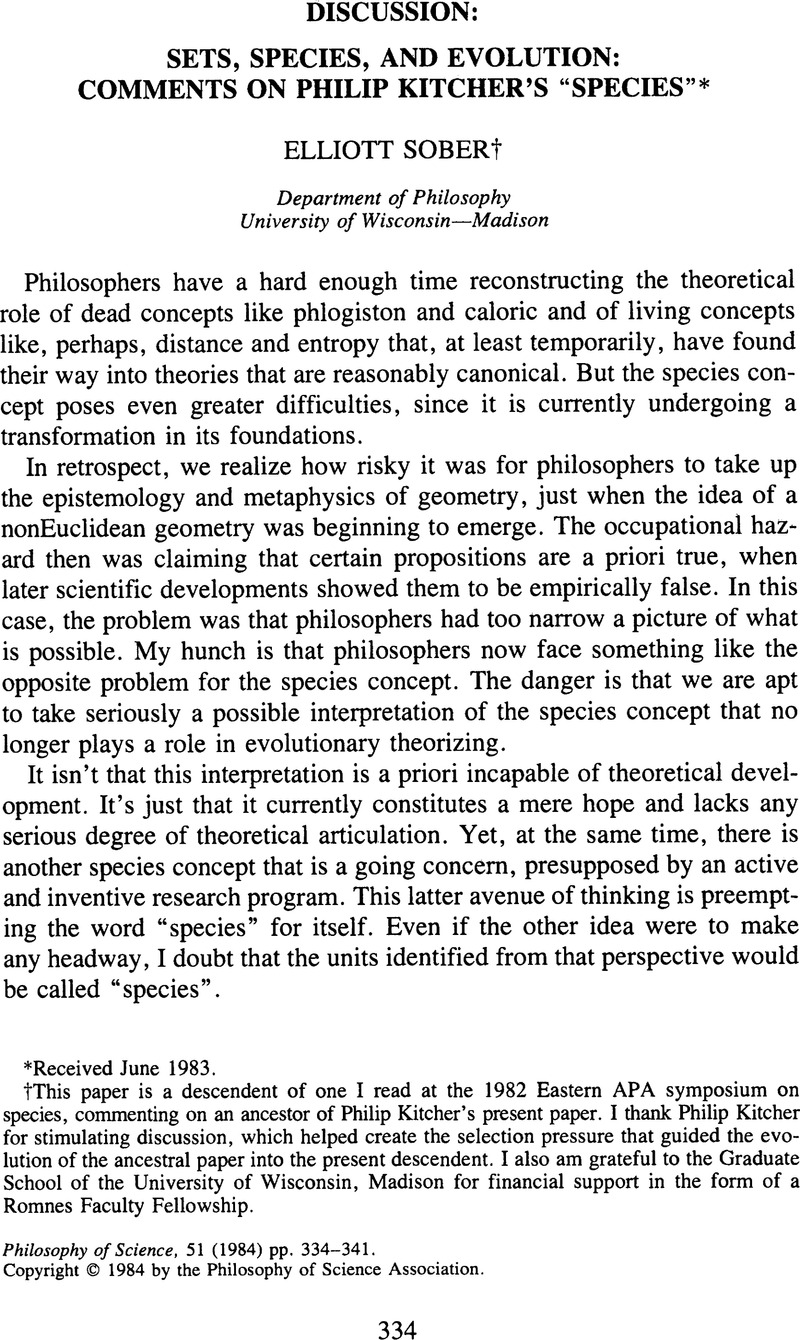Crossref Citations
This article has been cited by the following publications. This list is generated based on data provided by Crossref.
Kitcher, Philip
1984.
Against the Monism of The Moment: A Reply to Elliott Sober.
Philosophy of Science,
Vol. 51,
Issue. 4,
p.
616.
van der Steen, Wim J.
and
Voorzanger, Bart
1986.
Methodological problems in evolutionary biology VII. The species plague.
Acta Biotheoretica,
Vol. 35,
Issue. 3,
p.
205.
Hull, David L.
1986.
Logic, Methodology and Philosophy of Science VII, Proceedings of the Seventh International Congress of Logic, Methodology and Philosophy of Science.
Vol. 114,
Issue. ,
p.
643.
Enç, Berent
1986.
Essentialism without Individual Essences.
Midwest Studies in Philosophy,
Vol. 11,
Issue. ,
p.
403.
Dupré, John
1986.
Sex, Gender, and Essence.
Midwest Studies in Philosophy,
Vol. 11,
Issue. ,
p.
441.
Holsinger, Kent E.
1987.
Pluralism and Species Concepts, or When Must we Agree with One Another?.
Philosophy of Science,
Vol. 54,
Issue. 3,
p.
480.
Mishler, Brent D.
and
Brandon, Robert N.
1987.
Individuality, pluralism, and the phylogenetic species concept.
Biology & Philosophy,
Vol. 2,
Issue. 4,
p.
397.
Mayr, Ernst
1987.
Answers to these comments.
Biology & Philosophy,
Vol. 2,
Issue. 2,
p.
212.
Marks, J.
and
Staski, E.
1988.
Individuals and the evolution of biological and cultural systems.
Human Evolution,
Vol. 3,
Issue. 3,
p.
147.
Ghiselin, Michael T.
1988.
The individuality thesis, essences, and laws of nature.
Biology & Philosophy,
Vol. 3,
Issue. 4,
p.
467.
Van Valen, Leigh M.
1988.
Species, sets, and the derivative nature of Philosophy.
Biology & Philosophy,
Vol. 3,
Issue. 1,
p.
49.
de Queiroz, Kevin
1988.
Systematics and the Darwinian Revolution.
Philosophy of Science,
Vol. 55,
Issue. 2,
p.
238.
Splitter, Laurance J.
1988.
Species and Identity.
Philosophy of Science,
Vol. 55,
Issue. 3,
p.
323.
Kitcher, Philip
1989.
What the Philosophy of Biology Is.
Vol. 32,
Issue. ,
p.
183.
Kluge, Arnold G.
1990.
Species as historical individuals.
Biology & Philosophy,
Vol. 5,
Issue. 4,
p.
417.
Gifford, Fred
1990.
Genetic traits.
Biology & Philosophy,
Vol. 5,
Issue. 3,
p.
327.
Wilson, Bradley E.
1991.
Are species sets?.
Biology & Philosophy,
Vol. 6,
Issue. 4,
p.
413.
Ereshefsky, Marc
1992.
Eliminative Pluralism.
Philosophy of Science,
Vol. 59,
Issue. 4,
p.
671.
Mahner, Martin
1993.
What is a species?.
Journal for General Philosophy of Science,
Vol. 24,
Issue. 1,
p.
103.
Grantham, Todd A.
1993.
Beyond ?individuality? and ?pluralism?: A review of Ereshefsky'sUnits of Evolution: Essays on the Nature of Species.
Biology & Philosophy,
Vol. 8,
Issue. 4,
p.
457.



